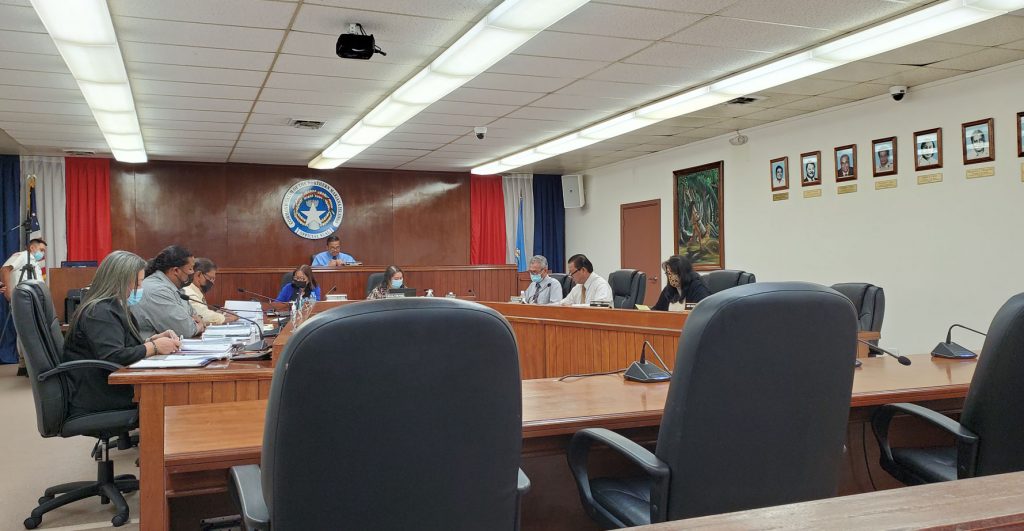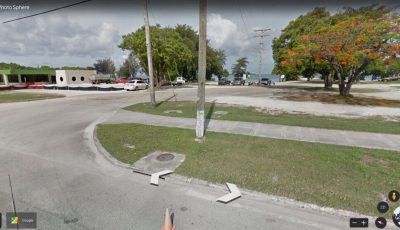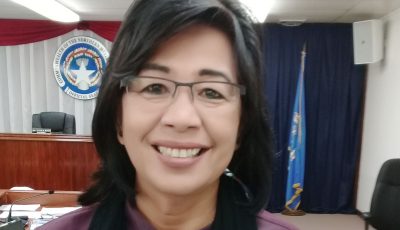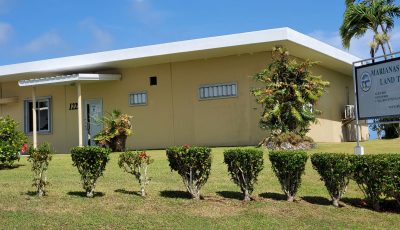Senate OKs bill that prohibits DPL from revoking homestead permits

Senate President Jude U. Hofschneider (R-Tinian) presides over a session Tuesday, during which the senators approved a bill that seeks to prohibit the Department of Public Lands from revoking a village or agricultural homestead permit after it is approved and issued. (FERDIE DE LA TORRE)
The Senate passed Tuesday a bill that seeks to prohibit the Department of Public Lands from revoking a village or agricultural homestead permit after it is already approved and issued after the applicant met all the requirements, including even if the applicant has no interest in the land at the time the permit is approved.
All eight senators present adopted the report of the Senate Committee on Resources, Economic Development and Programs that recommends passage of Senate Bill 22-22 in the form of Senate Substitute 1. Sen. Paul A. Manglona (Ind-Rota) was absent, but was excused.
The eight senators subsequently voted “yes” to pass the bill. The legislation now goes to the House of Representatives.
The bill, authored by Sen. Francisco Q. Cruz (R-Tinian) proposes to amend the provisions pertaining to village and agricultural homesteads on Saipan, Tinian, and Rota. It amends the statutory provisions of the village and agricultural homestead to uniformly apply to Rota, Tinian, and Saipan. The bill seeks to clarify the permitting process once an applicant has been approved and issued a homestead lot by DPL.
Article 11, Section 5 of the NMI Constitution mandates DPL to designate certain portions of public lands for homestead programs in the CNMI. An applicant with no interest in land at the time of applying may be issued one agricultural and one village homestead lot.
Cruz filed similar legislation in June 2020. The Senate passed the bill in December 2020, but the House did not act on it.
According to the report of the Committee on Resources, Economic Development Program chaired by Sen. Justo S. Quitugua (R-Saipan), upon approval, the current village homestead regulations require eligible applicants, or homesteaders, to comply with a three-year permit period upon issuance of the homestead permit.
The committee said the homesteader is required to use and improve the lot within 120 days, build a single family residence within two years, commence to reside in an issued homestead no later than the end of the second year, and continually reside throughout the third year.
However, the committee said major concerns were raised regarding the revocation of lots during the three-year permit period due to the homesteader’s acquisition of land through marriage, recipient of a deed by land by a parent or an estate; or purchase of affordable real property after the issuance of a homestead permit.
The committee cited that the NMI Administrative Code provides that to be eligible the applicant must not have an undivided interest in land. The committee said that “interest in land” is determined at the time the application is reviewed and approved. Therefore, the committee said, it is evident that DPL determines whether the applicant has an existing interest in land at the time of approval rather than basing it on interest in land that may occur in the future.
The committee finds that revoking a permit during the three-year permit period because the applicant acquired an interest in land during the three-year permit is contrary to DPL’s regulation, is unfair, and is unjustified.
The committee finds it necessary to prohibit DPL from revoking permits after it is approved regardless whether the applicant acquires another piece of land after the time the permit is approved.
The Commonwealth Code mandates the village homestead program for all three senatorial districts. The Code also provides for the Rota Village Homestead Reservation Act and for the Tinian Agricultural and Village Homesteads.
The committee finds it necessary to combine the village homestead provisions for Rota, Tinian, and Saipan. The committee also finds it necessary to provide for a Saipan agricultural homestead like Rota and Tinian.
The committee, however, finds that it is not necessary to touch the recently passed legislation that provides for the homestead program in the Northern Islands.
The committee agrees with the intent of consolidating only the village and agricultural homestead programs for Rota, Tinian, and Saipan.
The committee finds that “interest in land” has to be a “possessory interest in land” at the time DPL approved the permit. The committee agrees with DPL’s position that homesteaders who have already received the conveyance of the homestead and leased the property are no longer eligible for a new homestead lot in order to provide opportunities for eligible applicants awaiting issuance of a homestead lot.
DPL raised several reservations and objections to the bill. For one, DPL is concerned about the establishment of an agricultural homestead program for Saipan due to the dense population and challenges faced in identifying public lands available to satisfy the pending applicants under the village homestead program.
The committee finds that it is within DPL’s authority to determine the reasonable size of an agricultural lot, that DPL does not have to issue one hectare plots if there are inadequate available agricultural plots.
The committee finds that the permit revocations are unfair to those who were approved and complied with all the homestead requirements but were found at a subsequent time that they had acquired land. The committee said it is the intent of the legislation to prohibit such revocation.
A section of the bill provides for retroactive application to undo the revocations made by DPL in order to be fair to those permittees.



























